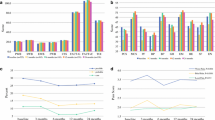Abstract
Background:Cytoreductive surgery plus intraperitoneal hyperthermic chemotherapy with mitomycin C for peritoneal carcinomatosis is used as a palliative treatment for a variety of malignancies. The purpose of this study was to measure the quality of life (QOL) of survivors (>3 years) after treatment.
Methods:Patients were interviewed by telephone with the following tools: (1) the Functional Assessment of Cancer Therapy–Colon (FACT-C), (2) the Short Form of the Medical Outcomes Study Questionnaire, (3) the Center for Epidemiologic Studies–Depression scale, (4) the Life Appreciation scale, (5) the Psychosocial Concerns Questionnaire, and (6) performance status rating.
Results:Seventeen (10 appendix, 5 large intestine, 1 ovarian, and 1 peritoneum) of 109 patients were interviewed from 3.1 to 8.0 years after treatment. Ten patients (62.5%) described their health as excellent or very good. No limitations on moderate activity were reported in 94% of cases. Paired t-tests were used to compare 10 patients who had baseline QOL data. FACT mean difference scores and P values (positive difference scores indicate improved QOL) were functional well-being: 4.9, P = .01; physical well-being: 3.3, P = .05; and FACT total: 14.3, P = .02.
Conclusions:Long-term survival with good QOL is possible for selected patients with peritoneal carcinomatosis after cytoreductive surgery plus intraperitoneal hyperthermic chemotherapy.
Similar content being viewed by others
REFERENCES
Spratt JS, Edwards E, Kubata T, Lineberg R, Tseng MT. Peritoneal carcinomatosis: anatomy, physiology, diagnosis, management. Curr Probl Cancer 1986; 10: 555–84.
Sugarbaker PH. Peritoneal Carcinomatosis. Drugs and Diseases. Boston: Kluwer, 1996.
Chu DZ, Lang NP, Thompson C, Osteen PK, Westbrook KC. Peritoneal carcinomatosis in nongynecologic malignancy. A prospective study of prognostic factors. Cancer 1989; 63: 364–7.
Marcus EA, Weber TK, Rodriguez-Bigas MA, Driscoll D, Meropol NJ, Petrelli NJ. Prognostic factors affecting survival in patients with colorectal carcinomatosis. Cancer Invest 1999; 17: 249–52.
Sadeghi B, Arvieux C, Glehen O, et al. Peritoneal carcinomatosis from non-gynecologic malignancies: results of the EVOCAPE 1 multicentric prospective study. Cancer 2000; 88: 358–63.
Loggie BW, Fleming RA, McQuellon RP, Russell GB, Geisinger KR. Cytoreductive surgery with intraperitoneal hyperthermic chemotherapy for disseminated peritoneal cancer of gastrointestinal origin. Am Surg 2000; 66: 561–8.
McQuellon RP, Loggie BW, Fleming RA, Russell GB, Lehman AB, Rambo TD. Quality of life after intraperitoneal hyperthermic chemotherapy (IPHC) for peritoneal carcinomatosis. Eur J Surg Oncol 2001; 27: 65–73.
McQuellon RP, Russell GB, Rambo TD, et al. Quality of life and psychological distress of bone marrow transplant recipients: the ‘time trajectory’ to recovery over the first year. Bone Marrow Transplant 1998; 21: 477–86.
McQuellon RP, Muss HB, Hoffman SL, Russell G, Craven B, Yellen SB. Patient preferences for treatment of metastatic breast cancer: a study of women with early-stage breast cancer. J Clin Oncol 1995; 13: 858–68.
McQuellon RP, Muss HB, Hoffman S, et al. The influence of treatment toxicity on treatment preferences of women with breast cancer. Proc Am Soc Clin Oncol 1994; 13: 76.
Cella DF, Tulsky DS, Gray G, et al. The Functional Assessment of Cancer Therapy scale: development and validation of the general measure. J Clin Oncol 1993; 11: 570–9.
Ware JE Jr, Snow KK, Kosinski M, Gandek B. SF-36 Health Survey. Manual and Interpretation Guide. Boston: Nimrod Press, 1993.
McHorney CA, Ware JE Jr, Lu JF, Sherbourne CD. The MOS 36-item Short-Form Health Survey (SF-36): III. Tests of data quality, scaling assumptions, and reliability across diverse patient groups. Med Care 1994; 32: 40–66.
McHorney CA, Ware JE Jr, Raczek AE. The MOS 36-Item Short-Form Health Survey (SF-36): II. Psychometric and clinical tests of validity in measuring physical and mental health constructs. Med Care 1993; 31: 247–63.
Radloff LS, Teri L. Use of the Center for Epidemiological Studies-Depression Scale with older adults. Clin Gerontol 1986; 5: 119–36.
Radloff LS. The CES-D scale: a self-report depression scale for research in the general population. Appl Psychol Meas 1977; 1: 385–401.
Zubrod CG, Schneiderman M, Frei E, et al. Appraisal of methods for the study of chemotherapy of cancer in man: comparative therapeutic trial of nitrogen mustard and triethylene thiophosphoramide. J Chronic Dis 1960; 11: 7–33.
Andrykowski MA, Cordova MJ, Hann DM, Jacobsen PB, Fields KK, Phillips G. Patients’ psychosocial concerns following stem cell transplantation. Bone Marrow Transplant 1999; 24: 1121–9.
McQuellon RP, Loggie BW, Russell GB, et al. Health related quality of life (QOL) before and after surgically directed intraperitoneal hyperthermic chemotherapy (IPHC) for peritoneal carcinomatosis (PC) (abstract). Proc Am Soc Clin Oncol 1997; 16: 76a.
Andrykowski MA, Brady MJ, Hunt JW. Positive psychosocial adjustment in potential bone marrow transplant recipients: cancer as a psychosocial transition. Psycho-Oncology 1993; 2: 201–76.
Author information
Authors and Affiliations
Corresponding author
Rights and permissions
About this article
Cite this article
McQuellon, R.P., Loggie, B.W., Lehman, A.B. et al. Long-Term Survivorship and Quality of Life After Cytoreductive Surgery Plus Intraperitoneal Hyperthermic Chemotherapy for Peritoneal Carcinomatosis. Ann Surg Oncol 10, 155–162 (2003). https://doi.org/10.1245/ASO.2003.03.067
Received:
Accepted:
Issue Date:
DOI: https://doi.org/10.1245/ASO.2003.03.067




